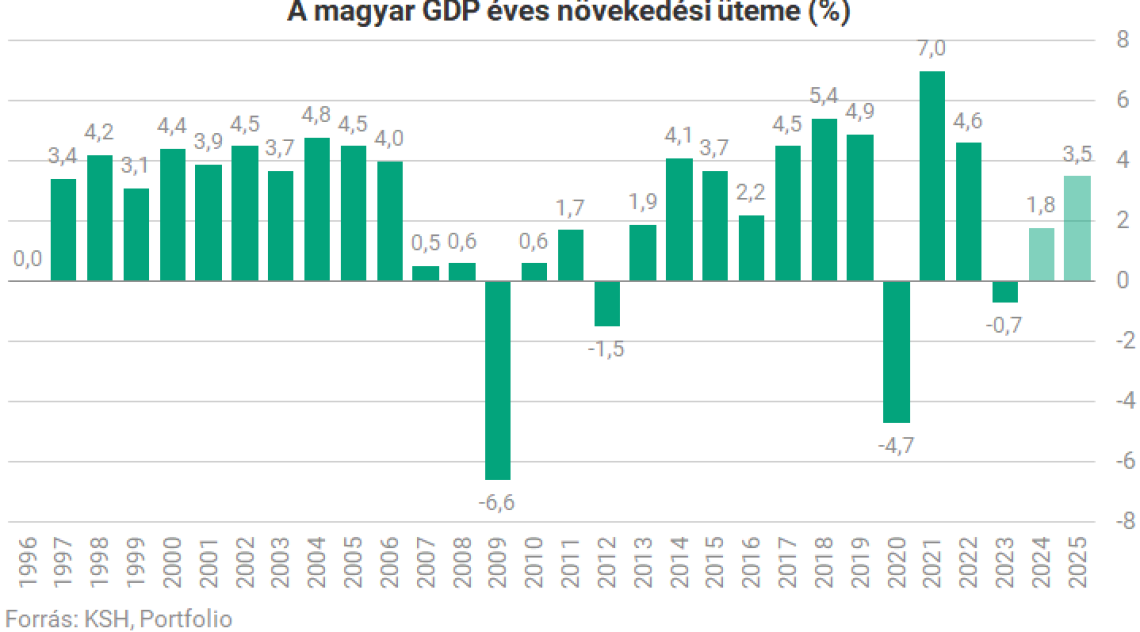

A significant turnaround has occurred in Hungarian economic policy: Márton Nagy, Minister of National Economy, presented the government’s new official macroeconomic prognosis during an off-the-record press briefing, stating that the new 2025 growth forecast is 1% instead of the previous 2.5%. This correction indicates an adjustment to reality and sends an important message to market participants.
The 1% GDP growth prognosis is much more realistic than the previous 2.5% expectation, although it is still optimistic compared to the latest analyst forecasts. It is good news that the government is adjusting its expectations to reality in a timely manner, thereby sending an important message to market participants, credit rating agencies, and financiers.
An interesting development is that the government did not touch the budget, which makes these new figures particularly intriguing. This indicates that the government maintains fiscal discipline while realistically assessing the economic outlook.
The ministry’s projection suggests that the Hungarian economy will achieve the long-desired 4% government growth target in one year’s time, in the second quarter of 2026. This means that the government remains optimistic about the medium-term outlook but realistically assesses the short-term challenges.
Márton Nagy also announced several new measures:
They are working on introducing a new housing assistance program for public sector employees, planned to be launched this September. This program could contribute to improving the competitiveness of the public sector and alleviating the housing crisis.
The minister announced a further extension of the 1+1 element of the Sándor Demján Program. This step is in line with the program’s previous success, where 45 billion forints have already reached SMEs.
Márton Nagy hinted that the government is also working on new tax reduction solutions. Details have not yet been released, but specifics were promised for September. This could be a positive signal for businesses.
The minister foreshadowed that they are considering creating a new scheme for retail government bonds in September. This step could serve to mobilize household savings.
The reduction in the GDP prognosis is a realistic reaction to the current economic environment. The Hungarian economy faces numerous challenges:
The more realistic prognosis is positively received by analysts, as the government demonstrates its ability to adapt to changing circumstances. This increases the credibility of economic policy and helps stabilize market expectations.
The newly announced measures – especially the tax reduction plans and the extension of the Sándor Demján Program – could provide positive impulses to the economy in the coming months.
The modification of the GDP prognosis and the package of new economic policy measures show that the government is proactively responding to economic challenges. The combination of reality-adjusted expectations and targeted support programs can contribute to the stabilization of the Hungarian economy and setting it on a long-term growth path.
Source: Portfolio.hu, Ministry of National Economy Image: Hungarian economic growth and GDP statistics
We use cookies to improve your experience on our site. By using our site, you consent to cookies.
Manage your cookie preferences below:
Essential cookies enable basic functions and are necessary for the proper function of the website.
These cookies are needed for adding comments on this website.
Google reCAPTCHA helps protect websites from spam and abuse by verifying user interactions through challenges.
Google Tag Manager simplifies the management of marketing tags on your website without code changes.
Statistics cookies collect information anonymously. This information helps us understand how visitors use our website.
Google Analytics is a powerful tool that tracks and analyzes website traffic for informed marketing decisions.
Service URL: policies.google.com
Clarity is a web analytics service that tracks and reports website traffic.
Service URL: clarity.microsoft.com
Marketing cookies are used to follow visitors to websites. The intention is to show ads that are relevant and engaging to the individual user.
Facebook Pixel is a web analytics service that tracks and reports website traffic.
Service URL: www.facebook.com
You can find more information in our Cookie Policy.